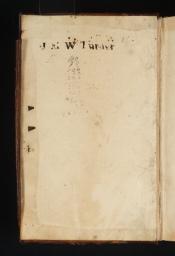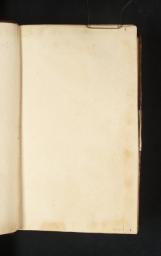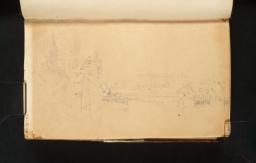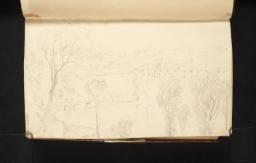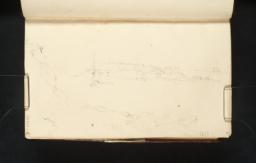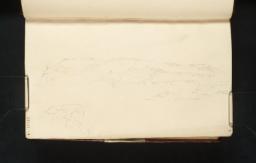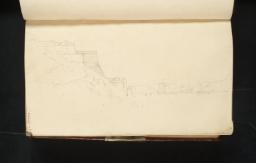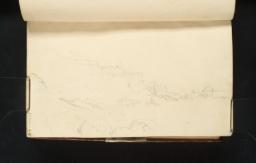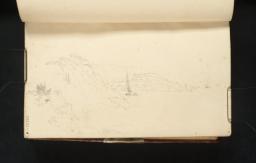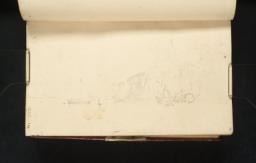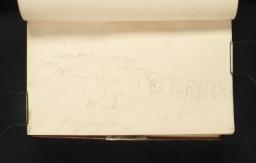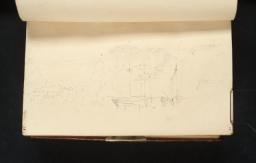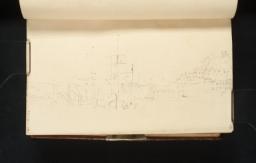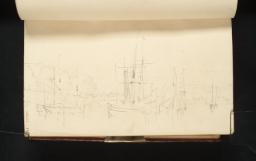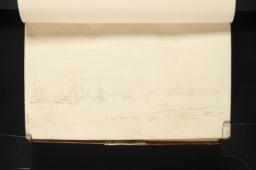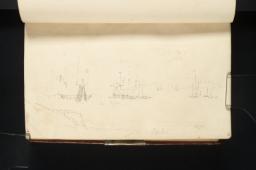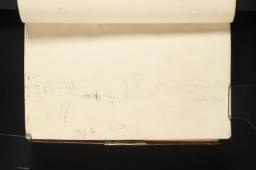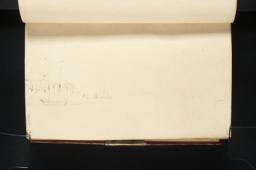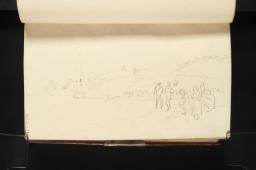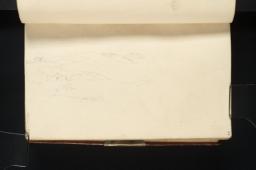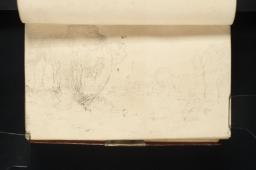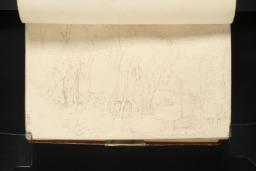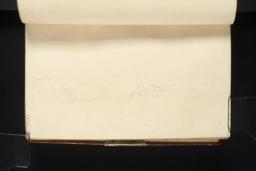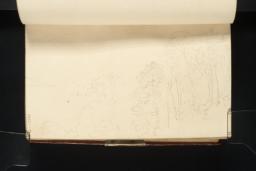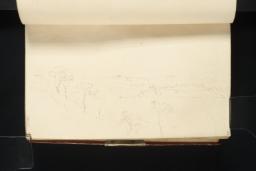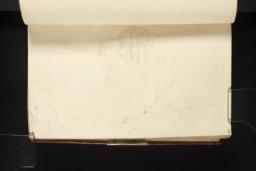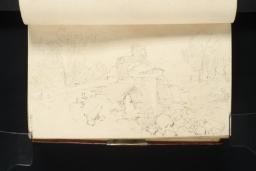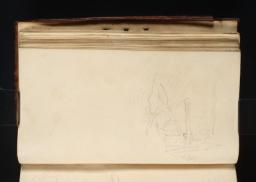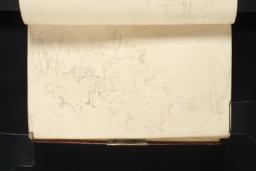Turner Bequest CXXXI 1–189a
Sketchbook bound in boards, covered in brown leather comprising original covers, blind-tooled with running flower motif borders, laid over a modern quarter-binding of heavier leather, with original boards and endpapers preserved, original spine with six transverse paired gilt rules laid on, leather of front fore-edge extending to form pencil holder, and remains of one brass clasp
278 leaves of white wove paper between paste-downs of the same, approximate page size 157 x 95 mm
Made at Ivy Mill, Maidstone; various pages watermarked ‘Ivy Mill | 1811’ and ‘Ivy Mill | 1812’
Inscribed by Turner on a label on the spine ‘116. Plymouth. Hamoaze’ (now missing), and in ink on the back cover (D40583) ‘Devon Coast | Plymouth’
Numbered 296 as part of the Turner Schedule in 1854 and endorsed by the Executors of the Turner Bequest, inside back cover (see main catalogue entry)
278 leaves of white wove paper between paste-downs of the same, approximate page size 157 x 95 mm
Made at Ivy Mill, Maidstone; various pages watermarked ‘Ivy Mill | 1811’ and ‘Ivy Mill | 1812’
Inscribed by Turner on a label on the spine ‘116. Plymouth. Hamoaze’ (now missing), and in ink on the back cover (D40583) ‘Devon Coast | Plymouth’
Numbered 296 as part of the Turner Schedule in 1854 and endorsed by the Executors of the Turner Bequest, inside back cover (see main catalogue entry)
Accepted by the nation as part of the Turner Bequest 1856
References
This sketchbook of Devon and Cornwall subjects (tentatively dated to 1812–13 by Finberg) was in use in the summer of 1813, as noted by Sam Smiles: ‘it includes sketches made on Turner’s trip [by sea from Plymouth] to Burgh Island and Kingsbridge for which we have Cyrus Redding’s eye-witness testimony’;1 see under folio 275 verso (D09476; Turner Bequest CXXXI 186a).
Turner mostly used this upright-format book turned so that individual drawings have horizontal ‘landscape’ proportions. As he worked inwards from both ends, drawings from the ‘front’ (following Ruskin and Finberg’s numbering) mostly appear on the rectos, while those working in from the ‘back’ are designated as versos. The subjects as far as folio 127 recto (D09358) are all identified or presumed sites within a few miles in and around Plymouth, suggesting a series of fairly short excursions. Mr Charles Nodder, a resident near Trematon Castle to the west of Plymouth, has used his local knowledge to write a privately circulated article discussing the relevant drawings in this sketchbook, after inspecting and discussing them with the present author,2 who is very grateful for his insights; see under folio 36 recto (D09255) and subsequent pages. The drawings working in from D09476 at the opposite end of the book, possibly extending as far as folio 228 verso (Tate D09382; Turner Bequest CXXXI 139a), may form a continuous sequence made over the relatively short time of the Burgh Island expedition, and appear a little less highly finished.
Smiles has noted definite or possible links between three drawings and oil sketches in the Turner Bequest showing ‘the same locations, though not from identical viewpoints’,3 presumably made on the same occasions in 1813: see the entries for folios 27 recto, 69 recto and 72 recto (D09244, D09292, D09295). A further such link can be made to the sketch on folio 3 recto (D09220). These oil sketches, unusual in Turner’s practice, are discussed in the Introduction to the tour.
Something of a red herring, in terms of the hilly setting and proximity within the sketchbook to Plymouth subjects, is a short sequence of views of the Highgate Archway, then on the rural northern outskirts of London. This impressive Roman aqueduct-style arch by John Nash was opened in August 1813 (and replaced in 1897), and Turner presumably made the short trip out of town specially to see it soon after his return from the West Country: see folios 128 verso (D09360; Turner Bequest CXXXI 128a) and various pages between 218 verso and 227 verso (D09362–D09380; Turner Bequest CXXXI 129a–138a).
Inside the back cover, the otherwise blank paste-down is inscribed by Turner’s executors Henry Scott Trimmer, Charles Turner, Sir Charles Lock Eastlake and John Prescott Knight in ink (with the book inverted) ‘No 296 [overwriting ‘179’] | Contains 179 leaves | Pencil sketches | H.S. Trimmer’ | ‘C Turner’ at the top, and in pencil ‘no.296 JPK’| ‘C.L.E.’ to the left below. Trimmer evidently confused the schedule number and tally of works momentarily, and the flamboyant schedule number is heavily corrected. The underlined repetition of the schedule number seems to be in Knight’s hand. There is also the blind-stamped Turner Bequest monogram a little above and to the left of centre and ‘CXXXI’ stamped in black at the top left (all relative locations are with the book held inverted in terms of its foliation).
Technical notes
How to cite
Matthew Imms, ‘Plymouth, Hamoaze Sketchbook 1813’, sketchbook, April 2014, in David Blayney Brown (ed.), J.M.W. Turner: Sketchbooks, Drawings and Watercolours, Tate Research Publication, September 2014, https://www

